#artur avalon
Text
Shakti and Shâkta
This edition of Sir John Woodroffe's "Shakti and Shakta" has been curated to enhance readability by removing annotations and footnotes. Readers can now embark on a pure and immersive journey into the heart of Shakti philosophy for personal enrichment. Woo
Shakti and Shâkta
by Arthur Avalon (Sir John Woodroffe)
Published 1918
London UK
This work was published to the Public Domain
Shakti & Shakta
This edition of Sir John Woodroffe’s “Shakti and Shakta” has been curated to enhance readability by removing annotations and footnotes. Readers can now embark on a pure and immersive journey into the heart of Shakti philosophy for personal…

View On WordPress
#artur avalon#asia#Divine Feminine#Goddess#religious studies#Shakti#sir#Tantra#tantric practice#woodroffe
0 notes
Text
Arthurian IFs
This is an extensive list of all the Arthurian inspired IFs out there for all of you who, like me, can't get enough. This list will be periodically edited to be as up to date as possible.
With Demo
Arthurian Tale: Camelot
Guinevere
Heavy is the Crown
The Bastard of Camelot
The King's Hound
Arthurian Tale: Camelot by Cain_Abel
Play as: Guinevere - customizable
ROs: King Arthur/Queen Elaine, Sir Kay, Lancelot, Lady Morgana, Sar Lunete
Status: chapter two complete
Du Lac by @dulac-if (blog deleted)
Play as: Lancelot - customizable
ROs: Arthur, Guinevere, Gawain, Galehaut
Status: Demo TBA -> indefinite Hiatus
From the Ashes by @fromtheashes-if
Play as: Viking MC
ROs: Arthur/Arthura/Artur, Frey/Freya, Lancelot, Morgana, Percival
Status: Demo TBA
Gates of Avalon by @gates-of-avalon-if
Play as: Lancelot - customizable
ROs: Arthur Pendragon, Gawaine, Morgaine le Fay, Gwynnever (Gwyn)
Status: Demo TBA
Guinevere by @newarcana
Play as: Guinevere - genderlocked female
ROs: Arthur, Lancelot, Morgana
Status: Book 1 (complete), Book 2 (ongoing) -> link
Guinevere by @guinevere-if
Play as: Guinevere - gender customizable
ROs: Arthur Pendragon, Lancelot du Lac, Morgana le Fay, Argante
Status: Demo TBA
Heavy is the Crown by @heavy-is-the-crown-if
Play as: a student of Arthurian's mytys
ROs: Arthur Pendragon/Le Fay, Morgana Pendragon/Le Fay, Merlin, Guinevere
Status: Prologue
In her Shadow by @in-her-shadow-if
Play as: Guinevere's younger sibling
ROs: Arthur Pendragon, Lancelot Du Lac, Merlin Emrys, Kay Ectorius, Morgana le Fay
Status: Demo TBA
Once & Future by @kaiwrites-if
Play as: Merlin - customizable
ROs: Arthur Pendragon, Morgana le Fay, Lancelot Du Lac, Guinevere, Gwaine (introduced in book 2)
Status: Demo TBA
Queen of Camelot by @queenofcamelot-if (blog deleted)
Play as: Guinevere - genderlocked female
ROs: Arthur Pendragon, Lancelot Du Lac, Henry/Henrietta
Status: Demo TBA
The Bastard of Camelot by @llamagirl28
Play as: Mordred - customizable
ROs: Gawain Alistair, Elaine Beauregard, Galahad du Lac, Nimue Wyllt, Isac Meier, Sophie Ezzo, Agravain Rivlin
Status: ch.4 complete
The Dance of Dragons by @thedanceofdragons-if
Play as: Arthur's younger sibling
ROs: Lancelot du Lac, Elaine Moriath, Gwion/Gwiyn, Caelum/Caelya, Kieran/Kiera
Status: Demo TBA
The Red and White Knight by @theredandwhiteknight-if
Play as: Lancelot - customizable
ROs: Guinevere, Gawain of Orkney, Galehaut of Far Isles, Morgan le Fay, Agravaine of Orkney, Sybil of Far Isles
Status: Demo TBA
The Sword of Avalon by @theswordofavalon-if
Play as: Excalibur - customizable
ROs: Arthur Pendragon, Vivien Lunete, Morgan/Morgana Le Fay, Emrys/Emrya Wyllt, Caelian/Caelia Aphelion
Status: Demo TBA
The King's Hound by @the-kingshound
Play as: Guinevere (loosely) - customizable
ROs: Arthur, Evaine, Yniol, Morien, Gwyar
Status: Chapter Two part 1
Touched by Fire by @touchedbyfire-if
Play as: Morgan(a) - customizable
ROs: Lancelot, Guinevere, Joseph/Josephine, Isaac/Isolde, Caelian/Caelia
Status: Demo TBA
#if I have missed some IFs please tell me!#the same applies if I made some mistakes#basically this is to help readers quickly find arthurian ifs based on their tastes#if recs
904 notes
·
View notes
Text
Digging through tombs never stops feeling completely wrong.
It felt wrong on Krokotopia and Avalon, felt horrible in Dragonspyre and Azteca.
It still feels just as bad in Mirage.
They are used to undead and ghosts and old bones.
But not usually ones this…
Enthusiastic?
“Yes! You! With the skin and robes and whatnot. Do you have a minute?”
They suppose, in the grand scheme of things, they should not be surprised. One oddity after another. But a talking skull—a talking skull with no body and no will to move and no…no monster? attached? Is a tiny bit out of the wizard’s realm of ordinary. So they agree to acquire the crystal for him, even if they doubt he’s really the key to defeating Xerxes.
They even oblige him and shove the damn thing with a horrid crack! into his empty eye socket.
And Ozzy the skull shoots out of his sarcophagus so fast that it makes them bolt backwards, one hand on their spell cards and the other reaching for a sword.
“Woah! You are jumpy aren’t you—have you done this before? Am I not the first magic flying skull you’ve ever helped break out of a tomb? Because honestly, that would be impressive.” When they show no sign of backing down he sort of drops a foot or so, hovering around eye level with them. “Do you really think I’m going to attack you? After you just did me a humongous favor? No! Lets go kick Overlord Xerxes back into the sand!”
Unsurprisingly, the bodyless brainless bonehead is a bit of a coward.
The wizard doesn’t mind, he’s an entertaining coward at least.
His narration of everything he knows—or used to know—about Mirage is a welcome distraction, even if it’s clear he’s not telling the whole story most of the time. That’s alright. Let Ozzy have his secrets. He’s very clearly harmless.
Not as much can be said for most of Mirage’s inhabitants, where everything from the flora to the very sand they walk upon seems to want them dead.
~*~
“Are you going to tell me what happened yet?” Suzie asks as she stares down the vision that is becoming somewhat commonplace—Duncan, looking more and more haggard as time passes, refusing to sleep, barely eating, sending papers scattering across the house that is technically Suzie and Artur’s but may as well just be his at this point.
“No.”
“I’ll tell them you’re here.”
Duncan groans, dropping his head to the table. “Suzie—I am trusting you not to get me killed—”
“—and I am asking for you to give me the bare minimum amount of information to trust you right back, used to be you wouldn’t shut up about what you were doing but—”
“—so I grew up and learned to shut my damn mouth—shouldn’t you be happy about that.”
“Maybe if you didn’t keep saying this is a matter of life or death!” she snaps back “For all everyone else knows you’ve been missing the better part of a year, not just all of us in Dragonspyre but the wizard has had the whole of Ravenwood and the city guard looking for you since you vanished—”
“—right, which is why I’m hiding out in your house like a fugitive, because everyone and their firecat is on the lookout for me.”
Duncan had shown up two weeks ago, angry and withdrawn and demanding—well, more like begging—Suzie let him hide out in her family home on Triton Avenue. There wasn’t any danger of discovery there, she and Artur had been the only Gryphonbanes left in Wizard City since childhood, and Artur was currently (and possibly eternally) too enamored with caring for the battledrakes to cause any potential problems. Which was a relief, as Artur might be more quick to tell people—he and Duncan has always been on…more delicate terms.
Which Suzie couldn’t blame him for.
Duncan was abrasive at best, downright condescending and mean at worst.
Suzie was just better at meeting him on the same level.
Speaking of which.
“If you don’t start talking I’m going to at least go get Marla.” Suzie tells him, though it's an empty threat. “All the Necromancers have been especially worried about you—I’m guessing because of what happened while you were all in Darkmoor—” Duncan lifts his head enough to glare at her. “—yeah yeah, pretend you hate me, I’m still the only one you trusted enough to keep you hidden.”
She finally sits down across from him at the table, mirroring his crossed arms and resting her chin on them. “Is this what Penny and Malorn feel like when they try to get the Wizard to talk to them?”
The look that gets her is so intense she thinks there ought to be some sort of energy discharge accompanying it. It’s not even fully angry. There’s a bitterness in it, a jealousy she wouldn’t recognize if she didn’t know him so well.
“That’s what this is, isn’t it?” She continues, “You got wrapped up in something like they do—”
“—I’m nothing like the wizard.”
“I didn’t say you were.” He is though, Suzie thinks. Whether he wants to believe it or not.
Silence falls again, longer now. Just the pair staring at one another.
Eventually she has to leave. She’s been fully leaning into the whole duelmaster thing at the academy and they’ve started hosting little tournaments among the Ravenwood graduates—there’s supposed to be one this afternoon. Part of her wants to call it off, or hand the reigns to Regina for today, she wants to sit here and pry until Duncan finally admits to whatever he’s done.
But there isn’t any point.
Not yet.
He isn’t ready.
She’ll come back tomorrow.
It’s as she’s just started to draw the recall sigil that he speaks again.
“You can tell them I’m safe,” It’s hesitant, and frustrated, like he’s trying not to say exactly what he’s saying. “just not where I am.”
It’s a little progress.
It’s enough.
She’ll sit on it for a bit, try to work out how to tell the others without inviting a flood of questions she cannot answer. The necromancers first, they deserve it most of all. She’s seen all three of them dipping in and out of the Myth classroom when their returns to Wizard City overlap, asking if Cyrus Drake has any news—normally she would think he’d hate that kind of interruption, but Duncan isn’t the only one who came back from Darkmoor different.
~*~
When Suzie comes back the following day, she finally finds Duncan asleep.
Read the whole series here <3
#wizard101#wizard101 fic#wizzy fandom#wizard101 fanfiction#w101#wizard101 fandom#wiz101#duncan grimwater#suzie gryphonbane#lark is still playing funky wizard game from their childhood#wizard101 fanfic
15 notes
·
View notes
Text
Magical summer: Excalibur
EXCALIBUR
Category: Arthurian literature and myth
Excalibur. The magical and mythical sword of King Arthur. Everybody knows the legend. Everybody knows the story.
The sword from the stone… Or the sword from the lake? Good question. Did king Arthur took the sword out of a rock? Or was the sword given to him by the Lady of the Lake? Which version do you know? Maybe one, maybe both… but know that both are technically correct. As I said before: the Arthurian myth is a mess.
Excalibur’s name is not even Excalibur. The sword began its career in Welsh literature, in a time the Arthurian myth was still deeply ingrained in the Celtic mythology (Welsh and Irish) : it was then called “Caldfwlch” or “Klaedvwlch” (it notably appears in “Culhwch and Olwen”, a Welsh text of the 11th or 12th century. At this point the sword is described as king Arthur’s most precious possession, but it isn’t his exclusive possession – in the poem describes above he lets one of his warriors, Llenlleawg (the Irish prototype of Lancelot) borrow it to kill an Irish king named Diwrnach and steal his magical cauldron (it is… a long story). Another Welsh text called “The Dream of Rhonabwy” does not name Artur’s sword but it describes it quite precisely as having two chimeras on the golden hilt: when the sword is unsheathed, the blade looks like fire poured out of the chimera’s mouth, making the sword so dreadful everybody tries to look away from it.
Arthurian literature and myth only really started to become popular with Geoffrey of Monmouth’s Latin work “Historia Regum Britanniaea” (The History of the King of Britain, published in the 12th century). It was a big hit in Europe, and by this time the sword of Arthur was renamed. It got the Latin named “Caliburnus”, which was later simplified as “Caliburn”. In this version of the tale, Caliburn was said to have been forged in the mythical land of Avalon, but so far we don’t know exactly how king Arthur got it.
To have some origin story, we will have to wait for the Arthurian craze to hit France. As the romance and tales of Arthur, Lancelot and the Knights of the Round Table swept old France, the sword went by many names, such as Caliborc or Escalibor, before finally finding its last name, “Excalibur” (for example in Chrétien de Troyes famous Arthurian tales, at the end of the 12th century, Excalibur didn’t exist as the sword – at one point borrowed by Gawain – is called “Escalibor” and said to be the finest sword ever made, able to slice through iron as if it was wood).
The story of the legendary “sword in the stone” comes actually from a French text called “Merlin”, written by Robert de Boron. Now, the story goes as such: Arthur obtained the British stone by going in a churchyard on Christmas Eve and pulling a sword from an anvil sitting on top of a stone – as Merlin himself explains, only a true heir of Uther Pendragon (the previous king) or someone appointed by God as the next ruler of England could have performed such a feat. The “Merlin” of Boron became part of a larger cycle of Old French Arthurian tales, gathered together in an ensemble called the “Vulgate cycle”, which as a whole heavily expanded the myth of the sword from the stone – who is left unnamed in Boron’s works, but becomes in other tales of the Vulgate Excalibur. We notably see the context of the “sword in the stone” explained: young Arthur had been adopted by Sir Ector and believed himself to be Ector’s son, ignoring his true father was Uther Pendragon. He acted as the squire of Sir Kay, and the challenge of the sword in the stone was set up to know the next ruler of the throne after Uther’s death. Many nobles tried to pull the sword, including Sir Kay, but all failed – yet teenage Arthur managed to do it without any effort, at first by accident, and then was asked to do it again publicly: thus Arthur was revealed as Uther’s true heir. The Vulgate cycle also adds what happened to Excalibur at the end of Arthur’s reign, in a text called “Mort Artu”: on the brink of death, King Arthur asks Griflet (a knight of the round table) to throw Excalibur into the enchanted lake where the Lady of the Lake dwells. Griflet tries and fail two times, because he deems the sword to be such a great artifact he can’t resolve himself to throw it away – but finally he agrees to his king’s final wish, and a hand comes out of the lake (supposed to be the Lady’s hand), catching the sword and taking it deep in the waters. As mentioned before, in Chrétien de Troyes’s works, Arthur allows one member of the Round Table to borrow his sword: Gawain, who is actually not only Arthur’s best knight but also the king’s nephew. Gawain using Excalibur as his own is also attested by the “Lancelot” text of the Vulgate.
Now, following the Vulgate cycle, a second “series” or “ensemble” of French text was formed : it was called the Post-Vulgate cycle, due to being made after the Vulgate was done, but unlike what the name implies, it is not a sequel of the first cycle. Rather it is a series of text that either offer to “expand” on the previous told story, or that completely rewrite the Vulgate. For example the Post-Vulgate includes Boron’s “Merlin” in its chronology and logic, but it reinterprets it completely, and as a result we have a Post-Vulgate Excalibur slightly different from the Vulgate Excalibur. In the Post-Vulgate texts, the Sword in the Stone and Excalibur are not the same sword. The Sword in the Stone, left unnamed, was broken by Arthur during a battle with the king named Pellinore. It happened quite early in Arthur’s reign, and on the advice of Merlin himself, Arthur went to the Lady of the Lake to obtain a new sword: she offered him Excalibur in exchange for a later boon (which she later invokes in a different story by asking for the head of a knight named Balin).
Now that the French part of the Arthurian myth is done, we can jump to Malory’s famous “Le Morte d’Arthur”, the iconic work which became a classical piece of literature in England and brought the Arthurian world back into the British isles in the 15th century (aka, as the Middle-Ages came to a close). Malory’s version of Excalibur became the most well-known and famous in England. In this version, Malory sticks with the idea that Excalibur was given to King Arthur by the Lady of the Lake, while the sword of the stone is much different. Malory also took back the whole “thrown in the lake after Arthur’s death” story, though he replaces Griflet with another knight of the Round Table, Bedivere. Malory also popularized more details that were present in a form of another beforehand, such as the idea that the blade of Excalibur has sentences engraved on each of its side (“Take me up” on one side, “Cast me away” on another), or that when Arthur first used it in battle, during a conflict against those that claimed he had no right to the throne, the blade shined so bright it blinded the king’s enemies. Malory’s text also heavily popularized another detail concerning Excalibur: the importance of its scabbard. For you see, in later Arthurian texts (including Malory’s works but also the Post-Vulgate), the scabbard of Excalibur possesses magical powers: when someone wears it, their wound never bleeds (which prevents hemorrhagic death). The scabbard notably plays a heavy role in Malory’s story. Basically at one point Morgan le Fay managed to make a copy of Excalibur, a fake sword she equipped her lover Accolon with in hope of dethroning Arthur – but in the duel that ensued, Arthur killed Accolon with the real Excalibur. Morgan, in revenge for her lover’s death, steals the magical scabbard, before throwing it into a lake. This breaks Arthur’s magical protection, and it condemns him to death during his final battle. (Merlin had already warned earlier Arthur that him favoring the sword over the sheath was a very bad idea, as in truth the sheath was much more important).
- - -
A fun fact about Malory's text - at one point in the story, before Arthur obtains Excalibur from the Lady of the Lake, Merlin calls the sword Arthur has "Excalibur" and describes it as obtained through a "miracle". It does lead to several interpretations: is it a mistake by Malory who got confused in his chronology? Does it mean the sword from the stone (aka the "miracle") was also named Excalibur, which means there would be two of them?
It is quite interesting to note that an Arthurian poem that predates Malory's text (but was retroactively named "The Alliterative Morte Arthur") describes King Arthur as owning two different swords. Excalibur is his "war sword", that he uses for battle : he notably used it to kill his own treacherous son, Mordred. But Arthur also owns a "peace sword", called Clarent, which is a ceremonial sword used for things such as knighting - but it is also this sword that would be Arthur's doom, as Mordred stole it to battle his father, and it is the sword he uses to mortally wound him.
Many modern interpretations used the named "Clarent" to designate the Sword in the Stone (when it is differentiated from the Excalibur-sword in the Lake), even though in the original text nothing says that Clarent is either the sword of the stone or the one of the lake.
20 notes
·
View notes
Photo
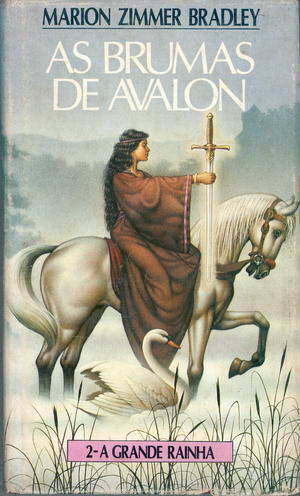
O segundo volume da série "As Brumas de Avalon". Revelando com as suas vidas e sentimentos, a lenda de Artur, como se fosse nova, e ao mesmo tempo levando o leitor a integrar-se na história, de maneira natural e profunda.
http://www.portodacompra.com.br/00756.html
0 notes
Photo
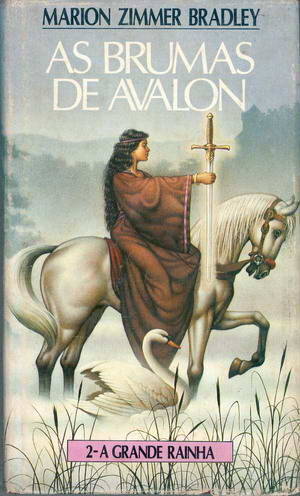
O segundo volume da série "As Brumas de Avalon". Revelando com as suas vidas e sentimentos, a lenda de Artur, como se fosse nova, e ao mesmo tempo levando o leitor a integrar-se na história, de maneira natural e profunda.
http://www.portodacompra.com.br/00756.html
0 notes
Text
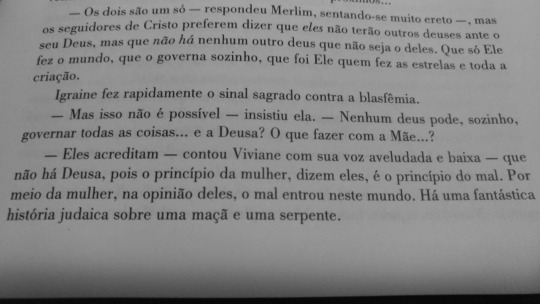
#poetry#trechos de livros#As brumas de Avalon#Rei Artur#Morgana#Morgauser#Igrene#Viviane#Merlim#Trechos#girlpwr#you go girl
8 notes
·
View notes
Text
All the arthurian movies I watched from best to worst (imho)
Regarding my opinions and my taste: I am okay with low budget, bad special effects and even bad/weird acting, I prefer enjoyment over any kind of historical accuracy. I also enjoy cheesy movies, and I prefer characters over plot, and plot over the rest (pace, acting etc.).I tend to prefer movies that uses characters with a reason (ex. using Morgause as Arthur's sister versus using a random guy and calling him Gaheris just because it's an arthurian sounding name). I am also a bit Mordred fan.
Monty Python and the Holy Grail
Camelot (musical, 1982 or the Vanessa Redgrave version) - this musical is one of my favorite musicals and one of my favorite arthurian adaptations. It makes Arthur a true protagonist and really put a lot of effort into showing how complex and important his dream is (also I love movies where a character has to renounce to something to protect an ideal)
Excalibur Kid (1999) - best trashy Connecticut Yankee movie, with Morgause as Arthur's sister and focusing on the protagonist convincing Arthur to be a king
Sir Gawain and the Green Knight (cartoon) - the best adaptation of Sir Gawain and the Green Knight
Sire Gauvain et le Chevalier Vert (French short) - the best non animated Gawain story at the moment
The Sword in the Stone
Sword of Lancelot (1963) - a classic Lancelot and Guinevere story, but probably because of the hawk-bearing Mordred and his plotting I really enjoyed it
A Connecticut Yankee in King Arthur's Court (1988) - a great adaptation of the book with a girl as the protagonist. It has nothing too different from usual, but the protagonist is great and Guinevere has a much bigger role than usual
Morte d'Arthur (1984) - a movie of just scenes and an external narrator, but it is so well done and some of the scene (Mordred's betrayal!) are amazing
Excalibur (1981)
Merlin and Arthur the Lion King - a cartoon, so expects it to be very kids-friendly, but it still manages to be fun and also one of the two movies with a Mordred redemption
Dragons of Camelot - extra trashy, but has a very thigh pace and gives a lot of depth to the characters, mostly Guinevere, Morgana, Lancelot and Galahad. It's so bad that it's good.
Merlin and the Sword - an extra trashy movie, but there are so many plot points (Nimue and Merlin, Ragnelle and Gawain, Lancelot and Guinevere, Morgana) that it ends up being entertaining
King Arthur: Legend of the Sword - pretty fun, a lot of strange humorous pacing, but using Kay as a random name, and not enough arthurian elements, it was clearly made to be the first of a series and kept a lot of elements for the future that never happened
A Knight in Camelot - another good Connecticut Yankee adaptation, with an interesting twist at the end
Arthur and Merlin (2015) - historical based, very nice visuals but Arthur and Merlin are the only real characters in the movie (and the only arthurian characters) and it seems more like it is setting the scene for a bright future that never comes, also very slow
New adventures of a Connecticut Yankee - this is so low because it's in Russian and I don't know Russian, but the visuals are AMAZING
The Knights of the Round Table (1953)
King Arthur: Knights of the Round Table (2017) - not really arthurian characters just strange reincarnations, a lot of absurd plot points, but pretty fun and one of the two movies in existence to have a Mordred redemption. Also, aliens. Far too long.
Percival 2007 - it was in Portoguese so I could understand little, but it looked very dramatic?
Quest for Camelot - the cartoon! Probably this is my nostalgia bias
King Arthur - good actors, not boring, but also nothing special and mostly focused on Lancelot and Arthur
Merlin and the Book of Beasts - classic 'Arthur's daughter has to reclaim the kingdom', but it glossed over the whole Mordred thing.
Arthur's Quest - a classic modern reincarnated Arthur fighting Morgana
A young connecticut yankee in King Arthur's court - a bad movie but so so fun. It also has evil Galahad and an amazing Morgana
Prince Valiant -classic Valiant adventure with more Gawain
Prince Valiant (1997) - classic Valiant adventure
Merlin and the War of Dragons - the plot is all over the place, but it manages to put together Igraine and Uther with Merlin's backstory. The only interesting part is the whole Nimue vs Viviane.
Avalon High (2010) - this low for having butchered the novel and ending up with confusing the plot and the whole sense of the novel. Still, definitely fun to watch for the right public.
First Knight - not too bad, but a bit boring and a story already seen. A classic Lancelot/Guinevere.
Guinevere (1994) - this is a mediocre movie about Guinevere and a loose adaptation of Persia Woolley's books.
Merlin the Return - so bad but also weirdly fun, a part for extra sexist Gawain
A kid in King Arthur's Court - my least favorite Connecticut Yankee movie, mostly because I really disliked the protagonist and the pace
King Arthur: Excalibur Rising - very slow pacing, focusing on Owain (here Arthur's son) vs Mordred, but spends little time on the characters themselves and mostly on setting Owain's big sword revelation and stuff
Lancelot du Lac (Lancelot and Guinevere) - I hate this movie. It's the classic Mordred finds out about Guinevere and Lancelot, but all the characters appear pretty boring with the exception of Gawain.
The Spaceman and King Arthur - this is so high in the list because it adds something new to the usual Connecticut Yankee story. But it's bad and pretty sexist.
Camelot The Legend cartoon - they sing and it's very bad
Sword of the Valiant - which is this low for the absurd way the butchered Gawain and the Green Knight
Merlin of the Crystal Cave - mostly focused on child Merlin and his mother
Merlin (1993) - not really an arthurian movie, as it's a modern times reincarnated lady of the lake stopping a prophecy. Nothing too exciting
Un espanol en la corte del rey Artur - a musical
Arthur and Merlin: Knights of Camelot - takes itself too seriously, Merlin is in it just for 10 minutes, focusing on Arthur's self angst, a lot of plot-points that makes little sense
Lancelot: Guardian of Time - this movie is weirdly fun, but the bad outweighs everything else, especially the sexism
The Sorcerer's Apprentice 2010 and 2002 - just bad, I hated both this movies but I preferred the 2020 one.
Pendragon: Sword of his Father - worst movie EVER. This is not an arthurian movie, just Christian propaganda with Arthur in it. It also makes no sense arthurian-wise.
Movies not in the list because they are not out yet:
Kaamelott part 1
Green Knight
Green Knight: The Movie
The Legend of Sir Mordred
Fate Grand/Order the movie
Movies not in the list because I could not find them to watch them or had no time to watch yet:
Red Shoes and the Seven Dwarves (not watched yet)
The Kid who would be King (not watched yet, SORRY)
Kids of the Round Table (I watched it but I remember nothing)
Merlin's Magic 2013 (never found)
Gawain and the Green Knight (1991, to watch soon)
Connemara (not watched yet)
Gawain and the Green Knight (1973) (watched it but so boring that I remember nothing)
Perceval le Gallois (I've watched it too long ago to remember)
Studio One: Connecticut Yankee (I've watched it too long ago to remember)
A Connecticut Yankee in King Arthur's court (the 1949 a d the 1931 ones)
Lancleot du Lac 1970 (it's pretty, but only in French so I did not watch it)
Camelot cartoon 1999 (I've watched but I remember nothing of it)
A Connecticut Yankee in King Arthur's Court (cartoon that I watched but don't remember)
Merlin: The Quest (never found it!)
the 9 movies pre 1921 because I could not find them or were in languages I could not understand
52 notes
·
View notes
Note
Oi, tudo bom? Queria saber se existem mais algum livro de lendas arthurianas que não brumas/crônicas do senhor da guerra/a trilogia do merlin da Mary Stewart aqui no Brasil? E por onde você consegue ler os que não tem aqui? Brigadinhaa
Olá, tudo bem e você? Boa pergunta, aqui no Brasil há raríssimas traduções de livros arthurianos. Além desses que você citou (Crônicas de Artur, Brumas de Avalon e a Trilogia de Merlin), você vai encontrar outros livros recentes e populares, como o do Tolkien, A Queda de Artur, e o famoso livro de T.H. White, A Espada na Pedra, que inspirou a animação da Disney.Fora esses acho que só os clássicos, como Percival ou o Romance do Graal e Cavaleiros da Távola Redonda de Chrétien de Troyes. Um que foi relançado recentemente com uma edição muito bonita foi o livro do Howard Pyle, Rei Arthur e os cavaleiros da Távola Redonda. Pelos sebos da vida é possível encontrar algumas obras perdidas, achei esses tempos um livro chamado História da Inglaterra para o pequeno Artur. Há, também, em português uma série de livros com referência arthuriana da Marion Zimmer Bradley (escritora de Brumas de Avalon), segue lista:
A queda de AtlantaOs Ancestrais de AvalonOs Corvos de AvalonA casa da FlorestaA senhora de AvalonA Sacerdotisa de Avalon
Bom, esses são os que eu conheço em Português. Se você lê em inglês, da pra achar em algumas livrarias o Le Morte D'Arthur, do Thomas Mallory. Infelizmente não conheço nenhuma tradução desse clássico. Respondendo mais precisamente a sua pergunta, eu procuro ebooks arthurianos no limbo da Amazon. Tanto os desconhecidos como os mais famosos. Há várias versões em ebook então fica fácil para nós brasileiros comprá-los. Alguns não tem, mas é possível importar pelo site, só que aí fica o preço dos nossos dois rins. Muitos dos livros que li - como a série Daughter of Tintagel - eu pedi para uma amiga trazer dos Estados Unidos. Infelizmente não temos muitos exemplares aqui no Brasil. Listei faz um tempo alguns livros sobre a Morgan le Fay que você pode conferir aqui. A maioria tem em ebook na Amazon com preço bem acessível!
Amigos brasileiros fãs de literatura arthuriana, uni-vos. Se alguém conhece mais, por favor comente no post.
#Rei Arthur#literatura arthuriana#literatura#books#answers#morgan le fay#arthurian#arthuriana#rei artur#tolkien#arthurianetwork#arthurian legend#marion zimmer bradley#as brumas de avalon#bernard cornwell#mary stewart#merlin#livros#brasil#livrododia
4 notes
·
View notes
Text
Przedszkola W Japonii. Część II: YMchien - Polonia.JP
Brutus został koronowany na ważnego króla wyspiarskiego Albionu, który na jego cześć nazwano później Brytanią. Sprzymierzone wojska zepchnęły Brytów do Walii i Kornwalii, zdobywając znaczniejszą grupa wyspiarskiego państwa, które od tej chwili określane jest Anglią. W Carmarthen, w Południowej Walii żył Merlin, którego mama twierdziła, że wcale nie trzeba składać Merlina w ofierze, ponieważ zna on wystarczająco dużo czarodziejskich sztuczek, by odkryć przyczynę zapadania się zamku. Asach w Walii. Z początku niepokojów politycznych nie możliwości mu wprawdzie było zdobyć tego urzędu. Kiedy a na swobodnym morzu zawrócili okręty, by ponownie zaatakować wyspiarskie królestwo, młody władca sięgnął w potyczce spośród nimi po zabiegi magiczne: krzyż chrześcijański i miecz Ekskalibur, stworzony dla niego na mitycznej wyspie Avalon. Wtedy jednak Hengist wystąpił ze prostymi saskimi oddziałami przeciwko Fortigernowi i przepędził go. Ważną w nich pozycję rzeczywiście odegrał osławiony Sas o imieniu Hengist. Aby zapobiec niebezpieczeństwo najazdu Piktów, mógł się rzeczywiście połączyć z Sasami, którzy pojawili się w Brytanii przypuszczalnie około roku 428. Jeszcze bardzo jego sprzymierzeńców umieszczało się w Brytanii ściągając nasze rodziny. Przeczuwając niebezpieczeństwo Gorlois wycofał się na proste rodzinne tereny, odsyłając małżonkę do twierdzy Tintagel.
Obok całego mnóstwa innych tematów przejmuje się głównie sprawą istnienia oraz czynów wielkiego króla Artura lub Artura, który od chwili opublikowania tego dzieła pobudza wyobraźnię niezliczonych autorów a po dziś dzień nieprzerwanie bywa bohaterem powieści i filmów. Z Andrzejem Kulką w świat O ile zwiedzanie pomnika Mt Rushmore, czy też większej rzeźby wodza Indian Crazy Horse zajmuje około godziny, toż silna spędzić całe tygodnie odpoczywając "na nowym powietrzu" i poszukując różnorodne zakątki Czarnych… Istniał jeszcze lat piętnaście, zanim nie otruli go zbuntowani Sasi. Po nim kierowało jeszcze 75 królów, między innymi Bladud i - w VIII wieku przed Chrystusem, - jego syn Leir albo Lear, którego losy zainspirowały Szekspira do powiedzenia słynnej tragedii. W którymś momencie panowania 75 królów, którzy przyszli po Brutusie, długo po królu Learze, na wyspę przybyli Rzymianie i - wbrew temu, jak było rzeczywiście - nie stworzyli z Brytanii czysto rzymskiego terytorium, lecz pozostawili jej stan samodzielnego, zobowiązanego płacić daniny królestwa.
Ponieważ Rzymianie nie są w kształcie dać należytego odporu, arcybiskup Londynu stosuje się o dopłata do bretońskiego króla Aldraenusa, który do konkurencje z najeźdźcami wysyła swego syna Konstantyna. Odnosi się ku innym królom. Uwarzył mu czarodziejski napój, który umożliwił Uterowi przedzierzgnąć się w Gorloisa. Pod koniec IV wieku po Chrystusie, brytańscy żołnierze podający w armii rzymskiego cesarza Maksimusa, który tenże był Brytem, robią na północy Galii królestwo Bretanii. Zastosowaliby to po raz drugi Sasi, tym łącznie z poradą Gormunda, króla Afryki, dodatkowo jego armii. Istnienie króla Riothamusa da się jednoznacznie zaświadczyć w zespole rzecz ujmując słabo udokumentowanej brytańskiej sprawie tego poziomu. Przepowiednia ograniczała się do kolejnego króla Artura. Spośród ostatniego nieprawego związku narodził się tutaj , którego prawowitość Uter potwierdził później w ten styl, że - już pod swoją dobrą postacią brytańskiego króla - poślubił wdowę po Gorloisie. Artur poślubił Ginewrę, damę pochodzenia rzymskiego. Mimo młodego wieku Artur godnie zastąpił ojca na tronie i wypędził rozpanoszonych Sasów z kraju.
Akordy miały być bezprawnie wyciągnięte z zespołu „Ma vie fout le camp” („My Life’s Getting Nowhere”), który skomponował belgijski twórca, Salvatore Acquaviva. Jednocześnie Merlin przepowiedział pojawienie się „odyńca z Kornwalii”, który pobije obcych. Zacheusz, który zamierzałem zobaczyć Jezusa. Cóż potrafi istnieć aż tak pięknego średniowiecznym eposie rycerskim, który Anie nie jest historycznie rzetelny, ani też nie jest duża powieścią ? Spór o następstwo tronu zażegnał ambitny szlachcic Fortigernm który sprowadził z klasztoru Konstanta i wspomógł mu objąć tron. Jego z serii kazał otruć Renweina, wskutek czego na tron królewski ponownie wrócił Fortigern. Fortigern zmarł tuż po roku 455. Nic nie wiadomo, jaką śmiercią umarł. Geoffrey z Monmouth zmarł około roku 1155. G łównym jego dziełem jest spisana po łacinie w Oksfordzie Historia królów Brytanii, wydana około roku 1136. Dzieło aspiruje jednak do poważnego zestawienia faktów historycznych, w rzeczywistości przecież stanowi samym z najdziwaczniejszych zbiorów ważnych i pięknych opowieści całej literatury Zachodu, posklejanych długimi pasażami domem z wielkiej wyobraźni, uskrzydlonej niefrasobliwym patriotycznym chciejstwem.

1 note
·
View note
Photo








After a few touch ups, here are my final designs for my concept class, top 4 are Avalon, bottom 4 are Camelot. Other than design and color I really wanted to explore how the lighting would effect the color throughout the day.
My idea for my theme is like Mad Max meets Tank Girl in the style of Adventure Time.
Insta: JessxCraig
#camelot#avalon#king artur#mountains#city#cityscape#landscape#environment#concept environment#design#visual development#concept art#art#artists on tumblr#artistsoninstagram#scad#red#blue#orange#green#lighting#series#illustration#photoshop#digital
43 notes
·
View notes
Text
Potrzebuję pomocy jestem bardzo ciężko chory i potrzebuje pomocy finansowej miałem kilka operacji krwawienie do móżdżku operacje głowy obecnie Miałem badanie kręgosłupa mam ucisk dodatkowo oczekuje na operacji nogi ponieważ mam nie zrośnięta kość po złamaniu codziennie kochana ma w bólach mam założone subkonto w fundacji Avalon numer subkonta 3385 Chrzanowski Artur Bardzo was proszę o pomoc finansową proszę was o darowiznę zawsze to ja starałem się pomagać nigdy nie wiedziałem że znajdzie się w takiej sytuacji pomóżcie mi pomóżcie mi dalej żyć
1 note
·
View note
Text

———☽◯☾ ———
🌙 Senhora do Lago, Fada Viviane ou simplesmente Viviane é, de acordo com a Lenda Arturiana, a mais importante sacerdotisa de Avalon.
Filha de Diana, a deusa dos bosques e irmã mais velha de Igraine (Mãe de Artur e Morgana), a fada tinha a missão de proteger e entregar a espada mágica do Rei Artur, a sagrada Excalibur.
Vários escritores e copistas a nomearam como Nimue, Viviane, Viviana, Vivienne, Elaine, Niniane, Nivian, Nyneve, Nimueh e outras variações. Segundo a lenda, a Senhora do lago deu a Artur espada sagrada Excalibur, que significa “aço cortado”.
Excalibur foi entregue a Arthur por Viviane, Merlin e Morgana em um ritual na ilha sagrada, com o juramento que quando fosse Rei da Bretanha, reinaria respeitando os cultos católicos, bem como os cultos de Avalon, bem como manteria a existência dela.
Excalibur possuía uma bainha sagrada, feita a mão por sua sobrinha Morgana também uma sarcedotisa de Avalon, em ritual que durou três dias, onde esta confeccionou a bainha com suas próprias mãos.
A bainha de Excalibur era especial, possuía a magia de Avalon para a proteção de Arthur que ainda que sofresse ferimentos jamais sangraria até a morte, quando travasse suas batalhas e guerras.
Avalon, através da Senhora do Lago, entregou Excalibur a Arthur para este reinasse e respeitasse a terra sagrada, contudo este quebrou seu juramento a partir de seu casamento com Guinevere, católica atuante, na grande batalha.
Ela foi morta por Mordred enquanto estava na comemoração de Pentecostes para pedir ao rei mais uma vez que ele fosse fiel às suas promessas sobre os antigos povos. Lancelot (Balam) matou Balim em vingança da morte da mãe.
O corpo da Dama do Lago não foi levado até Avalon para a despedida das outras sacerdotisas, e sim a Glastonbury, por ordens de Artur.
Viviane é a fiel representante da Deusa, a Sacerdotisa de Avalon. Ela ganhou muitas inimizades devido à sua devoção incondicional às suas crenças.
A misteriosa ilha de Avalon é a guardiã dos grandes mistérios eternos e sagrados; terra encantada que as mulheres governam pelo seu poder de gerar vida e onde o verdadeiro conhecimento é preservado.
Para os gauleses, os lagos eram divindades ou moradas dos deuses. Ouro e prata eram jogados nas suas águas. Eram considerados como palácios subterrâneos de diamantes, joias, cristais e de onde surgiam as fadas, as feiticeiras, as ninfas e sereias. Mas os lagos também atraíam os humanos igualmente para a morte pois sentiam-se enfeitiçados.
Conta a lenda, que Viviane teve um romance com o mago Merlin por conta de uma promessa. A Dama do Lago entregaria seu amor ao mago se este lhe ensinasse seus segredos de magia.
Em posse dos segredos, Viviane aproveitou esse conhecimento para aprisionar o Mago numa gruta. Merlin já havia visto seu próprio destino mas não conseguiu evitá-lo. Apesar disso, viveu feliz na companhia da mulher amada.
Visualize hoje a Dama do Lago lhe entregando a espada mágica que lhe trará força e sabedoria para conduzir a sua vida. Com a espada poderá cortar os obstáculos à sua frente e abrir caminho para o futuro dos seus sonhos. 🌙
———☽◯☾ ———
— [✿🖤Meus Estudos✿] - -❀ೃ .
○°•°♡Bom esse foi o meu blog espero que tenham gostado. Que os Deuses nos abençoe sempre!♡°•°○
4 notes
·
View notes
Photo
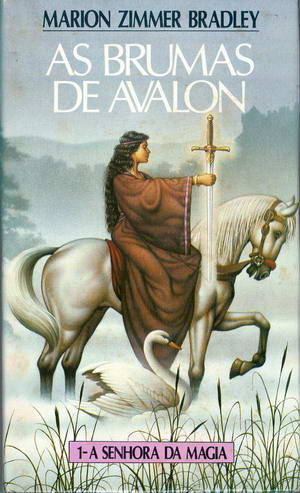
O primeiro volume da série "As Brumas de Avalon" conta a lenda do rei Artur através das vidas, das visões e da percepção das mulheres que nela tiveram um papel central...Siga o link
http://www.portodacompra.com.br/00755.html
0 notes
Photo
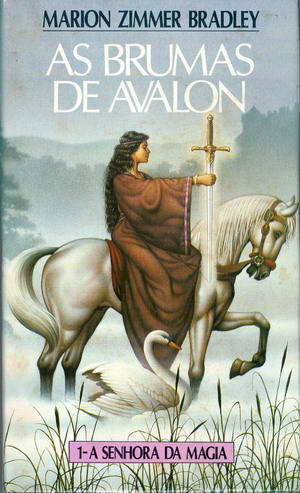
O primeiro volume da série "As Brumas de Avalon" conta a lenda do rei Artur através das vidas, das visões e da percepção das mulheres que nela tiveram um papel central...Siga o link
http://www.portodacompra.com.br/00755.html
0 notes
Text
O Filho de Odin, Cap. 6, “O Ataque dos Dragões a Madrid”
O Antevisão: no qual Jonatã se torna malabarista dos ares e desempenha as táticas de luta mais impossíveis de sempre, desafia a Wizards of the Coast a ser processado não uma mas duas vezes, e torna-se literalmente na Alexandra Solnado.
Amigos, ontem à noite comecei a escrever sobre este capítulo, e estava a correr bem. Descobri uma coisa aqui que me fez sentir bem comigo própria (lol), caguei-me a rir com o nível de absurdo, mas cometi um erro: escrevi directamente no tumblr e não gravei.
E... o PC desligou-se.
Após uma hora, foi tudo com o boda.
Este é o take 2, e sou eu a desafiar Deus.
(De duas formas... vocês já vão perceber)
Da próxima tenho que fazer isto alcoolizada.
Adiante...
O @rhythmlessgay mencionou uma coisa acerca do modo de viagem: isto de fazer uma história estilo RPG é muito fixo, mas lembram-se que havia aqui um Tigre super-sónico, correcto? Que poderia encurtar este tijo para metade? Ya.
Jonatã e o seu Bando dos Quatro chegam a Madrid, que numa tirada desnecessária mas de típico esgalho intelectual, Zuzarte nos diz ser “uma das maiores cidades da Península Ibérica”. As ruas estão todas animadas e o pessoal está todo a olhar para “um certo produto de venda” que nunca vai ser referido ou explicado.
-- Oh! primo (sic), olha! – disse ela [Mace] apontando. – Um homem com cabeça de cão.
-- É um cinocéfalo (Cynocephalus indica)
(Lembrem-se que, de acordo com as regras de pontuação, o Jonatã disse aquilo em voz alta.)
-- Um “quê”?
-- Um cinocéfalo, um comerciante da Índia.

Os “cinocéfalos” são mencionados como sendo os melhores comerciantes do mundo, e unca mais isto volta a ser revelante.
Não, cinocéfalos não são comerciantes indianos. São criaturas mitológicas aparentemente provinda do antigo Egipto e apropriada pelo Cristianismo. Efectivamente, são representados com cabeça de cão ou chacal, como é comum acontecer com criaturas mitológicas e deuses egípcios, sendo que representam o seu elemento/atributo (NÃO têm literalmente cabeça do dito animal). Não faço a mais pequena ideia do que é que se passou na cabeça do Zuzas para transformar isto num twist racista totalmente desnecssário e irrelevante para a narrativa.
Se existe uma explicação para isto e alguém a sabe, comuniquem-ma, porque estou muito curiosa.
Jonatã repara que junto da fonte de Cíbele estão uns gajos encapuzados e que um deles olha para ele, e depois Mace diz que tem fome, então arredam todos para o Mesónde Aragón para comer “queijo, presunto e chocolate quente” e eu tenho de dar a mão à palmatória ao Zuzarte porque esta merda é a cena mais madrilena possível.
Mace insiste que ela coma alguma coisa, mas Jonatã responde
para mim comer presunto é tão agradável como mastigar uma meia suada!

Só por essa, mereces um carolo.
Do nada---como é óbvio---o pessoal começa a gritar lá fora, e acontece que Madrid está a ser atacada por “Dragões Negros (Draco Necron)”.
Agora... Antes de prosseguir para o pedaço seguinte, eu gostava de falar de uma coisa.
Ponto número um:
Por vezes, mas apenas por vezes, a linha que separa o plágio da homenagem é muito ténue, e é tão ténue que só percebemos isso quando ela é mal recebida pela audiência. A literatura, como toda a arte, é feita de repetições, de evocações, de cópias. Na história da arte, das primeiras coisas que aprendemos, é que as coisas não surgem num vácuo, mas antes são repetidas e copiadas até que o artista, através deste acto de repetição, acaba por colocar a sua própria originalidade (que é a sua visão) na nova obra.
A literaura é igual, mas como se trata de palavras, e principalmente nesta era do “não existe originalidade e é tudo copiado”, é mais passível de cair nesta esparrela.
Contudo, os autores emprestam-se constantemente. Em Brave New World de Aldous Huxley, todas as personagens recebem o nome (por vezes adulterado) de personagens de outras obras ou históricas. Consta que Eça de Queiroz terá plagiado obras de Flaubert, e se comparem a Madame Bovary com o Primo Basílio, percebem que não só a temática é muito semelhante como estilisticamente, Eça drenou imenso de Flaubert (o discurso indirecto livre, por exemplo, que tem origem em Flaubert, acabou por ser introduzido por Eça). Garth Nix chamou o seu personagem de Touchstone em homenagem a Shakespeare (o que é evidenciado quando Sabriel lhe diz “Well, there is a tradition of a wise fool...”).
O exemplo mais conhecido é a famosa Plataforma 9 e ¾ de J.K. Rowling. Originalmente, a plataforma 9 e ¾ vem de um conto de Eva Ibbotson, intitulado precisamente “Plataforma 9 e ¾”. As semelhanças são as que esperam: a plataforma funciona de maneira muito semelhante à de Harry Potter. Foi a maneira de J.K. Rowling homenagear uma escritora que lhe serviu de inspiração. Muita gente na altura a acusou de plágio, mas a própria Eva Ibbotson não se importou, e na verdade, sentiu-se bastante elogiada. “Escritores emprestam ideias uns aos outros” foi a resposta dela, e uma frase de que não me esqueci.
Nem sempre isto corre bem. Cassandra Clare chegou a ir a tribunal por plagiar trechos inteiros de textos no seu The Mortal Instruments, e muitos outros casos houve. Mais recentemente, até o Diogo Morgado sofreu do mesmo mal com uma peça de teatro.
Portanto, isto de ver ou ler uma coisa que nos inspira e adaptar à nossa obra é um trabalho complexo e difícil. Quando se é jovem, é bem complicado de de gerir todas estas coisas FIXE que curtimos bué e saber como usá-las como referência se desrespeitar o criador original (POR ISSO É QUE EXISTE FANFICTION).
Eu faço o mesmo hoje em dia: dou nomes a personagem de livros que me inspiraram, e numa certa instância, cheguei a inserir parte de uma frase Allan Poe que me serviu de guia para todo o conto como forma de elogiar um autor que admiro.
No século XIX, até se tornou trope comum utilizar referências literárias a obras existentes suas contemporâneas para fazer foreshadowing (vão ler histórias de mulheres adúlteras e contem quantas delas estão a ler a Dama das Camélias, no início).
Isto não está errado. É muito bonito, na verdade. Eu adoro olhar para uma obra ou ler um livro e perceber imediatamente que influ��ncias estão ali. Diz-me muito sobre o autor.
Mas quando é mal feito, ou feito em excesso, chega àquele nível em que nos questionamos: afinal, o que é que aqui pertence realmente ao autor? O que é que é orignal de todo, se isto não é mais do que um pastiche de merdas que já existem e que ele cola com cuspo?
Eu sei que vocês estão a pensar “oh Ana, só agora é que estás a pensar nisso?, isto é uma manta de retalhos de cenas roubadas” sim, eu sei. Mas até aqui, o que ele tem feito é copiar a visualidade da coisa, transformá-la em palavras, ou imitar backstory de personagens populares. E o problema que dilui aqui as complicações é este: pode não ser considerado plágio, porque a backstory trágica de um herói do bem que vira para o mal, é um trope, não um caso único. Atenção que eu concordo a 100% que isto é plágio, mas uma boa defesa poderia perfeitamente provar que não é. O que quero dizer é que está muito, muito diluído aqui.
Se o Zuzarte tivesse utilizado uma personagem de WoW apenas---descrevendo-lhe o físico tal e qual, adulterando o nome ligeiramente, mais ou menos importando os seus poderes---sendo original no resto, inventivo e com capacidade de criar um mundo de fantasia urbana realmente atraente (e se essa personagem não for o protagonista), não considerávamos plágio. Só consideramos porque ele faz isto repetidamente. E mal: são cópias a papel químico.
Pá, eu me confesso: já criei personagens que são a total inversão de um personagem que existe. Uma delas foi Morgaine (do mito arturiano, especificamente Brumas de Avalon) que me serviu de tal inspiração que a adaptei em físico, e virei-a da cabeça para baixo na essência, porque ela tem de existir para a minha narrativa, não a da Mario Zimmer Bradley. Na verdade, a sua existência é o polo oposto da Morgaine: a mulher do povo das fadas, responsável pela queda do Rei Artur, passa a ser a mulher que simula uma grandiosidade mística (quando é só alta e veste-se de preto) que consegue colocar no trono um rei digno.
Portanto, qual é a linha que separa uma homenagem do plágio?
E é aqui que chegamos ao meu segundo ponto:
Eu tenho um talento, juro-vos. Quando estava no secundário, a minha professora de Literatura Portuguesa dizia que eu tinha capacidade para imitar qualquer estilo de escrita de qualquer escritor. Eu consigo MUITO FACILMENTE apanhar padrões, tiques e maneirismos. Eu percebo logo que mecanismos literários estão a utilizar, principalmente através das figuras de estilo, que são uma coisa a que presto muita atenção. Se houvesse maneira de o fazer, eu podia ser falsificadora de manuscritos porque consigo muito facilmente imitar quase ipsis verbis o estilo exacto de Eça de Queiroz ou de Saramago.
(É um talento inútil, pronto, alguns têm talento para coisas úteis, eu não tive sorte.)
Porque eu apanho muito facilmente os padrões, os pequenos detalhes que definem o estilo, a pequeninas coisas que me dizem que este gajo escreve assim. Lembram-se de eu, há uns capítulos atrás, ter dito que sempre que o Zuzarte usa “deixava antever” para descrever as roupas de alguém, eu tinha certeza de que aquilo era retirado de um outro autor qualquer? É a isso que me refiro. Eu tenho uma mente um bocado obsessiva no que toca a escrita, o meu cérebro organiza-se mesmo num padrão bem semelhante a OCD, e fico completamente sugada por estas coisas.
Portanto, a este ponto, eu já apanhei o estilo do Zuzarte. Eu já o conheço muito bem.
Por isso, quando li este excerto:
As cabeças dos Dragrões são parecidas com o crânio deles, em virtude de os olhos estarem muito encolhidos para o interior e as fossas nasais serem muito abertas. Têm cornos curvados para a frente e uma crista dorsal semelhante à de um peixe-aranha, que desce até três quartos do pescoço. Um cheiro a ácido emanava do dragão cinzento-escuro, cujas escamas são da cor do ébano. Em vez de fogo, estes animais cospem um ácido resultante dos seus sucos gástricos, suficientemente forte para derreter titânio.
...imediatamente eu percebi: não foi ele que escreveu isto.
Os red flags são os seguintes: “em virtude de”, “crista dorsal” e “sucos gástricos”. Estas três expressões foram as que me denunciaram que isto não vem da cabeça do Zuzarte.
Segundo: é o melhor parágrafo de todo o livro até agora. Não existe uma única vírgula mal colocada. As frases não têm qualquer erro de sintase. São perfeitamente construídas. Ele usa inclusivamente a inversão do sujeito, o que ele NUNCA usou até agora, e tão bem aplicado que imediatamente me fez piscar os olhos em alerta. Ele usa, perfeitamente, uma oração explicativa sem um “que” ou um “porque”. Existe harmonia, existe balanço, existe um equilíbrio perfeito entre adjectivação.
Mas o “em virtude de” foi o que me lançou o alerta. Nem pensar que um miúdo de 14 anos que não sabe conjugar o verbo pôr, não entende a eficácia de “disse”, e segue tão à risca a colocação de vírgulas por cada oração diferente que dá uma cadência ao texto que parece de asmático, teria a capacidade de colocar “em virtude de” para construir uma frase onde a forma passiva é transformada. Eu acho que o Zuzarte, se usou uma frase passiva até agora, deve ter sido uma vez.
Mas deixou ainda assim a sua marca Zuzarte: “semelhante à de um peixe-aranha” e a menção do facto de estes dragões não cuspirem fogo, mas ácido.
Se o Zuarte tivesse omitido a parte do fogo, eu teria levado mais tempo a perceber de onde é que isto veio. Mas foi a necessidade de dizer que estes dragões não são como os outros, mas são especiais. Porque o Zuzas tem um bichinho de pedante, ele adora discorrer informação, e mostrar aos outros que sabe mais. O livro está feito para alguém que não é nerd, para que ele possa subir ao seu próprio pódio e explicar todas estas coisas que ele adora com linguagem quase científica. Mas está tão carregado dessas referências que, a maioria delas, ele acaba por se esquecer de explicar.
E quando explica, tem de nos informar que, sim senhora, os dragões cospem fogo, mas estes não.
E foi isso que me denunciou exactamente de onde é que ele foi copiar, quase ipsis verbis, este trecho.
Levei 5 minutos:
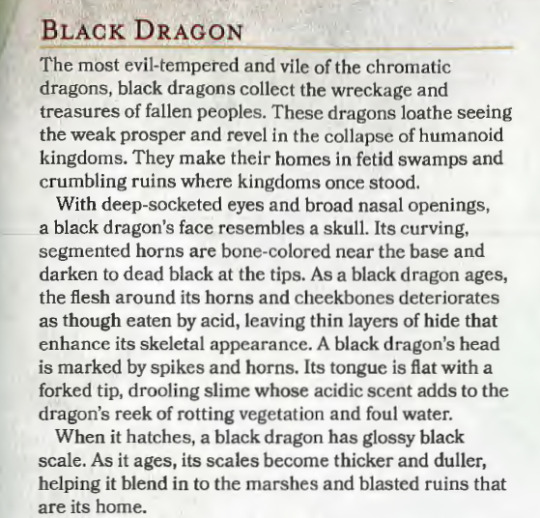
(Importa-nos o segundo parágrafo.)
Reparem que ele não copiou no sentido exacto de copiar. Ele adaptou, principalmente invertendo as orações.
Assim,
With deep-socketed eyes and broad nasal openings, a black dragon’s face resembles a skull.
Passa a,
As cabeças dos Dragrões são parecidas com o crânio deles, em virtude de os olhos estarem muito encolhidos para o interior e as fossas nasais serem muito abertas.
(Era isto que queria dizer com “inversão do sujeito”)
Não só as orações foram invertidas, como ele acrescentou um toquezinho de algo pessoal—fossas nasais muito abertas e olhos encolhidos para o interior (que é também muito Zuzarte, já que ele revelou a incapacidade de dizer “encovados” ou “afundados”, ou uma só palavra que expressasse que os olhos não só são encolhidos, como o são para o interior).
Eu ponho as mãos no fogo em como quem traduziu isto não foi ele, mas um adulto (não se esqueçam que Google Translate não existia em 2004). Aquele “em virtude de” é um toque demasiado bom para o padrão de escrita que ele tem vindo a mostrar. Isto foi literalmente um exercício de inversão de orações, tal e qual como eu fazia nas aulas de português do 9.º ano. Só que alguém lhe disse que substituísse “por causa de” por “em virtude de”
Do mesmo modo,
Its curving, segmented horns are bone-colored near the base and darken to dead black at the tips.
Passa a,
Têm cornos curvados para a frente e uma crista dorsal semelhante à de um peixe-aranha, que desce até três quartos do pescoço.
Ele não largou a cor totalmente: ignorou o “bone-colored” e manteve o elemento negro, que adocicou chamando-lhe “ébano”, passando-o para as escamas. Mas transformou a “segmented horns” em “crista dorsal” da única maneira que o Zuzarte sabe fazer como forma de mostrar: com uma comparação: “semelhante a um peixe-aranha”.
Agora eu quero que percebam isto: o que acabaram de ler é plágio. Se forem ler as provas de tribunal usadas contra a Cassandra Clare, as nuances são muito menores do que estas. Mas porque é que isto sobressai, e porque é que me leva a perceber que foi copiado?
Precisamente o que disse: em termos de linguagem, sobressalta à vista, porque é completamente diferente do que vimos até então. Foi de tal maneira, que assim que eu li “Em vez de fogo, [...]cospem um ácido” eu disse imediatamente “o gajo foi buscar isto a Dungeons and Dragons”.
Porque o Monster Manual está escrito para ser aquilo que diz no título: um manual. Por isso é que soa a entradas científicas: é suposto dar os detalhe físicos de uma criatura, os elementos que a compõem, e porquê de serem assim, porque não têm história, mas características gerais e/ou background. O Monster Manual é um manual para nós criarmos a nossa própria história.
E quando li este troço e senti que estava a ler uma entrada da National Geographic, percebi imediatamente de onde veio. Ele podia ter ido buscar exactamente a mesma descrição, claro! Dragões são dragões, estamos sempre cingidos a certos limites. Eles vão quase sempre ter o mesmo aspecto. Mesmo Dragon Age ou Skyrim não diferem muito disto. É normal. A questão é que ele roubou as palavras do livro, e adocicou-as com um pequeno pozinho de originalidade que foi, ultimamente, e a meu ver, o que o traiu.
Wizards of the Coast, call me bitch
Prosseguindo...
Jonatã diz a Iori e Mace que vão para dentro, porque são meninas e portanto inúteis e precisam de constante protecção, e ordena Te’Chall e Kenchi que tomem conta delas, porque ele sinceramente acha que consegue dar conta de pelo menos três dragões sozinho.
Lembram-se do Te’Chall dizer “ó estúpido, achas mesmo que consegues continuar a tua viagem sem um feiticeiro?” Ya, caga nisso.
Mas como isto é Zuzarte, a gente sabe que claro que consegue dar conta de tudo sozinho.
viu uma mulher com um bebé de colo a fugir de um dragão. A infeliz tropeçou, o bebé rebolou no chão e começou a chorar; um dragão mergulhava na direcção dela, e [Jonatã] nem pensou duas vezes: pegou num barril e correu na direcção da mulher e do réptil alado.
Eu aqui pensei: ok, vai enfiar o puto no barril para o manter protegido. Se calhar o dragão vai lá com garras e a madeira defende. Inteligente, Jonatã!
Mas não.
Assim que estava a uma distância considerável, atirou o barril com toda a força para o focinho do dragão. Este, com o choque, foi obrigado a desviar a rota, indo contra uma casa, destruindo-a.

Jonatã ajuda a moça a dar de frosques, e
Depois pegou no arco e apontou uma flecha ao dragão inconsciente.
O carolo foi tal que ficou inconsciente! Caralho, tu nunca tentaste pegar num barril, pois não?
Isto é pura e simplesmente “encontrar uma solução à pressa” porque nada na frase anterior nos disse que o bicho ficou inconsciente. A este ponto, o Zuzarte percebeu “espera aí... isto é um dragão! Tenho de lhe fazer downgrade! Já sei: inconsciente” e seguiu.
Mas, nesse preciso momento, o réptil levantou-se e olhou com uns olhos assassinos para o seu atacante,

que não mostrou medo e continuou a apontar o arco.
Claro que não.
Num impulso, o dragão ia a atirar-se ao rapaz, quando este disparou a sua flecha de fogo, rebentando com o estômago do réptil.
E queixam-se vocês da facilidade de Skyrim.
(Já agora, eu estou a pôr a negrito “réptil” porque, em dois parágrafos, ele já utilizou a palavra três vezes, e quero que sintam o quanto forte é para ser tão repetida assim, porque o Zuzarte não sabe escrever uma frase com omissão de sujeito.)
(E eu nem diria que um dragão se assemelha a um réptil. Para mim é mais uma galinha do inferno que um réptil.)
Um outro dragão viu o que se sucedera e também atacou. O réptil voador mergulhava com grande velocidade devido ao peso do seu corpo. Abriu a boca para engolir [Jonatã], mas este esquivou-se com um salto e uma pirueta no ar.

Quando aterrou, tocou uma nota na sua trompa, e Arthos apareceu. [Jonatã] deu um salto semelhante ao que dera em Toledo e aterrou em cima das costas de Arthos.
Vocês, leitores: Como é que ele saltou, mesmo?
Eu, com 2 neurónios restantes: Não sei, mas foi parecido àquele salto que deu em Toledo.
(Deve ser tipo Jessica Jones. Não voa, salta alto!)
Entretanto outro dragão, que vira o seu camarada falhar o primeiro ataque, virou-se e tentou atacar [Jonatã] e Arthos. O grifo subiu até chegar aos dez mil metros de altitude, com o dragão sepre a segui-lo. Então, [Jonatã] saltou das costas do grifo e mergulhou a pique em direcção ao solo, sempre com atacante a segui-lo, até que apontou o arco e disparou inúmeras flechas, fazendo parar o seu perseguidor.

Continuava em queda livre, quando se virou para baixo e viu o solo a cerca de dez metros de distância; então tapou a cara com a mão e gritou. Nesse instante, Arthos apanhou-o, salvando-lhe a vida. Entretanto, o dragão ganhou terreno e estava quase a engoli-los quando [Jonatã] desembainhou a espada, saltou para a cabeça do animal e enterrou-lhe a espada no crânio. O dragão gritou de dor e o sangue jorrou para as mãos de [Jonatã], queimando-as, pois o sangue de um Dragão Negro tem o mesmo efeito corrosivo que o seu bafo.

[Jonatã] largou a espada e caiu cerca de oito metros do chão. Ficou com as mãos completamente queimadas e o seu corpo contorcia-se com dores. Mas as queimaduras desapareceram em segundos e as mãos ficaram novamente bem, prontas a agarrar fosse o que fosse.
(NÃO, ESTEJAM DESCANSADOS QUE EU NÃO ME VOU ESQUECER DESTE DETALHE)
Tal como o Herói Insuportável, a espada continua Imaculada. Jonatã olha para a fonte de Cíbele e vêum dos encapuzados, e para um miúdo que joga tanto RPG, aparentemente ele não aprendeu que “gajo encapuzado” significa “get the fuck out of there”. Por isso, Jonatã vai lá, e diz-lhe a ele que baze, mas eis que
O estranho virou-se e dois olhos vermelhos brilhavam dentro do capuz. O homem tirou o capuz e [Jonatã] viu que “aquilo” era um meio-dragão.
Os meios-dragões têm pele verde-escura, mandíbulas e garras afiadas e um par de cornos curvados para a frente a saírem da cabeça ou de cima dos olhos.
(estão a ver a diferença de linguagem entre este pedaço de exposição e o anterior sobre Dragões Negros?)
Portanto, o man é um dragonborn. Mas com cornos de Tiefling, se calhar para lhe dar estética.
Ou será que os cornos estão ali... porque vêm de algum lado...
-- És o responsável pelo ataque? – perguntou [Jonatã].
-- Sssim, eu ssssou Graz’zt, o senhor dos Dragõesssssss Negrosssssss da Penínssssssula Ibérica. Drácula prometeu-me uma boa recompenssssa por matar um tal Ssstrongheart – respondeu ele com uma voz de humano misturada com o sibilar de uma serpente.

“misturada com o sibilar de uma serpente?” Foda-se, vê lá que eu não tinha mesmo reparado nisso.
E agora já percebi porque é que este Dragonborn tem aquele cornichos tão stylish. Da próxima tenta não roubar a personagem inteira, ao menos.
(o gajo fala como o Scam Likely LMAO)
Graz’zt recorda-se da descrição do Jonatã que Drácula lhe deu, e é a seguinte:
cabelo prateado, compleição atlética, e grande manejador de Glam, o “Pesadelo dos Dragões”.
Porque caralho é o pesadelo dos dragões? O man literalmente nunca viu um dragão na vida, é a primeira vez, e já era o pesadelo deles antes de os ver??? Mas o Jonatã é para os dragões tipo um first date marcado por Tinder, perspectiva de um pesadelo antes de se conhecerem????
desembainhou a espada e atacou-o. Este defendeu-se com Glam, que tinha o dobro do tamanho da de Graz’zt.

Espadas maiores não são impressionantes, só tens de as saber usar. Se o gajo for bom espadachim, consegue defender-se de um cutelo de 5 metros com duas adagas (à helicóptero lmaooo)
Mas pronto, o prologamente da espada é proporcional ao prologamento em falta do micropénis do Zuzarte.
Já agora, aquele “este defendeu-se” está confuso. Quando se usa “este” em lugar do sujeito, subentende-se que diz respeito ao sujeito da oração (ou frase) imediatamente anterior---que é Graz’zt, não Jonatã. Jonatã é o objecto.
O combate foi demorado, Graz’zt deu um golpe na horizontal, mas [Jonatã] baixou-se e passou-lhe uma rasteira com o calcanhar; enquanto o inimigo estava no chão, o jovem tentou espetar-lhe com a espada na cabeça. Mas Graz’zt rastejou como uma serpente, esquivando-se ao golpe. Ao levantar-se, o meio-dragão cuspiu ácido para o peito de [Jonatã]; felizmente ele comprara aquela armadura de Mithril que o protegeu.
«-- Foram mil pesetas bem gastas» -- pensou para si mesmo.

Quando o Zuzas diz que “o combate foi longo” quer dizer que vai levar não dois, mas três golpes. Doidão, heim.
Já agora, alguém já tentou desenhar estes combates? Porque esta merda parece Dance Dance Revolution. Não mata, mas mói.
Graz’zt de repente começa a voar com asas que lhe aparecem das costas, sibila mais um bocado enquanto diz a Jonatã que isto não acabou, e vocês sabem neste momento que vai acabar agora.
-- Isso é o que tu julgas, Graz’zt – respondeu [Jonatã], que com um salto e um golpe de espada cortou o atacante ao meio pelo tronco até ao ombro.

Relembrem-se que, quando ele fez isto, o Lagarto estava a voar.
Ofegante, [Jonatã] olhou em volta e só viu destruição. Dirigiu-se para a fonte de Cíbele, sentou-se no seu rebordo, olhou para baixo, deixou cair a espada, respirou fundo e fechou os olhos. Passados alguns instantes, uma luz vinda do céu iluminou Madrid, os edifícios reconstruíram-se e as pessoas regressaram à vida.

Oh não....
O rapaz olhou para cima, levantou-se e virou-se para a fonte. No meio das nuvens, viu a figura de um homem a olhar para ele.
ZUZARTE NÃO FAÇAS O QUE EU ESTOU A PENSAR QUE VAIS FAZER...
Este homem vestia uma túnica branca, tinha a barba ligada ao cabelo e um aspecto muito belo.
NÃO TE ATREVAS
Era Deus, Pai de todos os Homens na Terra, e de Jesus Cristo, que se sacrificou por nós.
VAI PARA O CARALHO
-- [Jonatã] – chamou Deus.
-- Não acredito nos meus olhos, devo estar doido – disse o jovem, boquiaberto.
-- [Jonatã ], meu filho.
-- Filho? Eu sou filho de Deus? Então Jesus é meu irmão? – perguntou ele, confuso.
-- É uma forma de expressão, caraças, eu sou Deus, pá, e sou obrigado a falar assim, julgas que eu gosto de falar desta maneira?
Pá, eu vou ser sincera... Esta última frase teve piada. O Zuzarte é mau a criar situation comedy, e eu nem estava à espera que ele encontrasse punchline decente, mas teve piada. Não que eu me tenha rido às gargalhadas, foi mais um

(MAS OH MEU DEUS, JONATÃ, SÓ PORQUE UM DEUS TE APARECE À FRENTE NÃO QUER DIZER QUE SEJAS FILHO DELES TODOS, O MUNDO NÃO GIRA À VOLTA DA TUA MICROPIÇA E FALTA DE AMOR-PRÓPRIO CRL)
Zuzarte prolonga um raro momento de comédia eficaz por demasiado tempo e arruina a coisa, e Deus diz que, obviamente, tem um presente para ele por ter SOZINHO arrebentado com quatro ou cinco dragões:
Uma espada desceu do céu e caiu aos pés de [Jonatã], enterrando a lâmina prateada e cintilante no chão. O guarda-mão da espada era de ferro, com uma cruz no meio. Do interior da cruz, saíam cinco rubis redondos, que formavam uma outra cruz. O cabo estava envolto num tecido vermelho e um rubi redondo no fim mostrava que a espada era uma autêntica relíquia, um tesouro inestimável.
Claro que é.
Já que entraste em teologia cristã (fodeste-te porque é a minha área), só é relíquia se tiver lá um pedaço de santo morto ou algo que pertenceu a um mártir, portanto fode-te.
-- Chamo-lhe “Vingadora”, muito adequado, não achas? Foi o meu amigo Arcanjo Gabriel que a forjou com o fogo dos pecadores, a lâmina é de prata puta, inquebrável, mais afiada do que um x-acto e nunca se gasta.

Prata é capaz de ser o pior metal a seguir ao ouro para utilizar como arma. Por alguma razão, não havia armas de prata.
Deus dá-lhe ainda outra prenda:
... Um baralho de cartas apareceu na mão esquerda de [Jonatã].
-- Podes utilizar essas cartas para invocares seres que poderão e irão ajudar-te na viagem. Podes também ganhar alguns cobres nuns joguitos. Cumprimentos do teu tetra-avô.
(Sim, é um Deck of Summoning de D&D. Não sei se é exactamente isto, mas soube logo que era de D&D porque por acaso já vi ser utilizado numa campanha. A Wizards of the Coast conseguiria fazer tanto dinheiro à custa deste puto...)
[...] [Jonatã] olhou para a Glam e depois para Deus.
-- Mas, Deus, eu já tenho uma espada.
-- O quê?! Não queres a outra?!
-- Não, não é isso, é que... vou andar com duas espadas ao mesmo tempo? Uma é maior que a outra...
Deus suspirou e depois apareceu um homem com uma pele de lobo vestida, capacete viking dourado sem cornos e botas de couro. Era Sigmund, o antepassado “viking” de [Jonatã]. Estendeu-lhe a mão e pediu que lhe devolvesse a Glam. Ele obedeceu e Sigmund desapareceu.
Eu quero ficar piursa com a merda de parágrafo que acabei de ler, mas adoro este merdas aparecer do nada e tipo “devolve essa merda, só tens direito a uma”.
Tenho também que referir uma coisa: Zuzarte adapta ao português todos os estrangeirismos que utiliza, excepto um: viking. Porque é cool. Mas tens de manter o consenso, Zuzas. “Viquingue” fica feio, ya, mas foi o caminho que escolheste seguir. Se adaptas à língua portuguesa todas as outras expressões, vais adaptar essa também. Caso contrário, metes em itálico.
[Jonatã] virou-se e viu Madrid completamente reconstruída. As pessoas estavam vivas e parecia que nada lhes tinha acontecido. Iori, Kenchi, Mace e Te’Chall saíram da pequena estalagem e foram ter com o amigo. Os habitantes de Madrid fizeram o mesmo e sabendo que fora ele que salvara a cidade, saudaram-no com gritos de alegria e aplausos.
Também foi ele que destruiu a cidade. Tipo, estando presente. Eu pensaria que as pessoas conseguissem perceber que nada disto teria acontecido se este puto não estivesse ali.
O rei espanhol saiu à rua para o receber como um herói que era.
Isto é o Zuzarte a escrever esta passagem:
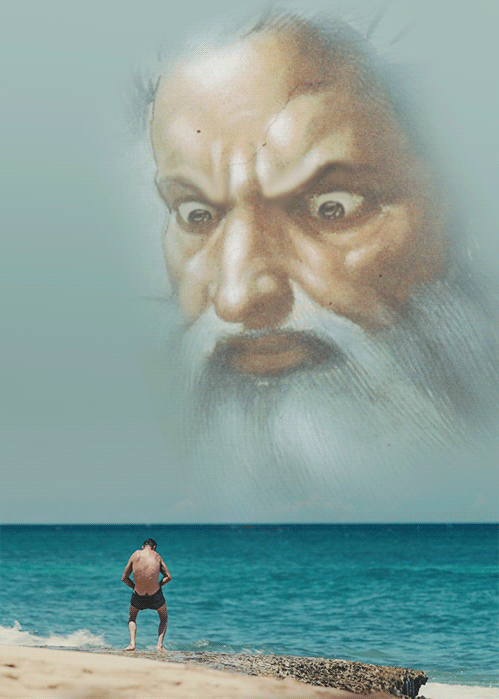
E o rei de espanha veio desde o escorial ou o caralho em 5 segundos de propósito só para lhe lamber o cu.
-- Muito obrigado por ter salvo a minha cidade, meu jovem. Os Espanhóis recordarão este dia pela sua heroicidade. Como é que se chama?
-- [Jonatã] Strongheart, às suas ordens – apresentou-se [Jonatã], fazendo uma vénia.
Finalmente anos a ser educado nas elites de Cascais serviram-te de alguma coisa.
E é VOSSAS ordens, palhaço.
Surge Arthos, que chama ao rei “rei dos espanholitos”, e o rei de espanha, por razão absolutamente nenhuma, reconhece-o como sendo “Arthos Pena Prateada” (mas toda a gente é prateada, aqui?) e
Após uma pequena conversa com o rei, os dois juntaram-se aos amigos e saíram de Madrid.
Portanto, andaste a colectar companheiros para absolutamente nada.
Já agora, aquela cura milagrosa das queimaduras? Nunca foi explicado. Ele nunca disse que foi Deus (que era o que eu estava à espera, sinceramente).
Portanto, eu vou ter de acrescentar “self healing” aos sistemas de overpower do Jonatã.
E AINDA NINGUÉM FOI DORMIR! JÁ ESTAMOS A IR PARA O TERCEIRO DIA E ESTE PESSOAL ESTÁ COM MAIS DE 48H SEM DORMIR EM CIMA QUE CARALHO, É OUTRO PODER TEU, JONATÃ?
______________________
Balanço final:
Jonatã
Sistemas de overpowering:
- Supervisão.
- Lobisomem ??
- Magia ?? veremos
- Poderes de Self-healing ???
Armas em sua posse:
- Trompa de guerra que faz tanta cena que deixei de perceber
- Arco mágico
- Armadura de Mithral COM BOTAS
- Duas facas Texas Chainsaw Massacre Approved ™
- Flechas de Enyo que arrebentam com a estratosfera e provocam um desastre nuclear.
- Só agora é que reparei que me esqueci de meter a Glam LMAOOO
- “Vingadora”, a espada do arcanjo Gabriel, nem mais nem menos...
Kenchi
- Bué da shurikens
- Katana Que Cheira o Diabo
- Binóculos
- Tigre que corre a 800km por segundo, à velocidade da luz ou do som
Iori:
- Espada curta
- escudo do Capitão América mas meio steampunk, suponho
- Arco e flechas
Mace:
- duas adagas
- Besta de mão, o que quer que isso seja.
___________________________
Anteriores:
—- Capítulo 1.
—- Capítulo 2.
—- Capítulo 3.
—- Capítulo 4.
—- Capítulo 5.
39 notes
·
View notes